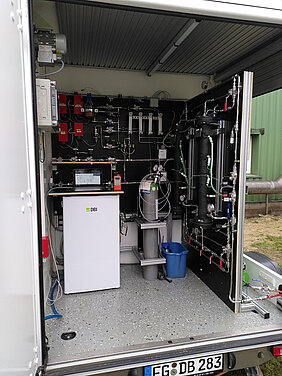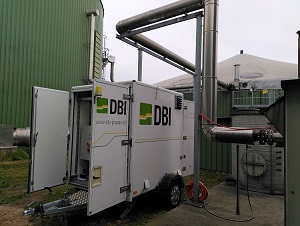The field tests on large-scale biogas and sewage gas plants with a mobile pilot plant with two fixed-bed adsorbers for the removal of hydrogen sulfide from raw biogas as part of the “Fabio” project showed that filter material from filter systems for the removal of iron and manganese from groundwater can be used as adsorbents for the removal of hydrogen sulfide from raw biogas under realistic conditions.
The aim of the R&D project “Fabio” was to demonstrate the suitability of filter materials from drinking water treatment as adsorbents for the removal of hydrogen sulfide from biogas under realistic conditions.
In preparation for this, a survey was carried out among operators of drinking water treatment plants on the specific processes of iron removal and manganese removal in order to identify connections to suitability as a gas cleaning compound based on the results of the previous project “HiPur” (ref.: 34036/01).
To gain deeper understanding, detailed investigations were carried out on specific materials using a scanning electron microscope to examine the structure and composition of suitable materials.
The core of the Fabio project was the implementation of field tests using a mobile laboratory, in which H₂S adsorption on filter sands was carried out on real biogas or sewage gas. The tests were carried out at an agricultural biogas plant with a focus on liquid manure fermentation in Oschätzchen (Brandenburg), as well as a sewage treatment plant with co-digestion of industrial waste in Radeberg (Saxony).
In several laboratory tests the removal capacity for hydrogen sulfide of the filter materials in the original fraction (grain size), fundamental dependencies were determined. In addition to proving the successful H₂S deposition on the materials used, the influence of process engineering process variables such as heating of the reactors, gas and material moisture, space velocity and cascading was examined. In particular, the space velocity was of significant importance both in terms of the achievable separation performance and in the practical container design.
The results of the field tests served as a reliable basis for the design of adsorbers in practice and the determination of expected service lives under real conditions. Recommendations for practical application were derived.
The result was that filter materials from drinking water treatment are generally suitable as adsorbents for the desulfurization of real biogases. Depending on the place of origin of the filter sand, there were significant differences in the performance of the H₂S separation. In the future, before the masses are used on a large scale - for the process engineering design of the apparatus technology - laboratory tests should be carried out as described before.
The field tests have shown that the filter materials from drinking water treatment may be used for desulfurization of biogas with little effort in the original grain size, provided that they are chemically suitable. A proof of suitability as well as tests for design and service life are required and possible for specific materials.
The volatile availability of the materials and the need for declaration analyzes when placing the loaded materials on the market as fertilizer or during any final landfilling that may be necessary were identified as possible barriers to use. This obstacle must be placed in relation to the increasing prices of commercially available adsorbents so that the filter materials can offer an economic advantage for a limited time and locally.
From an economic point of view, materials can therefore be classified as interesting. Furthermore, the environmentally relevant effects of closing material cycles and conserving resources with the higher-quality use of the “waste product” filter sand are to be assessed as unreservedly positive.
Publications
Manig, R.; Birkner, C.; Lipp, P.; Dammann, E.: Entschwefelung von Biogas mittels Filtersand. DVGW energie | wasser-praxis 01/2021, 44-48 (2021)
Lipp, P.; Schwotzer, M.; Manig, R.; Birkner, C.: Entschwefelung im Fokus – Einsatz von Filtermaterialien aus der Enteisenung/Entmanganung als Gasreinigungsmasse auf Biogas- und Kläranlagen. DVGW energie | wasser-praxis 09/2023, 66-73 (2023)
Birkner, C.; Lipp, P.: Feldtest zur höherwertigen Nutzung von Filtersanden als Sorbens zur Aufbereitung biogener Gase (FABIO). Vortrag beim DVGW Forum Wasseraufbereitung am 08.11.2023

![[Translate to English:] Prüfstelle-Produktprüfung_Teststand Test centre and product testing](/fileadmin/_processed_/0/9/csm_TZW-Karlsruhe_Pruefung_Geraete-Teststand_377188946c.jpg)

























